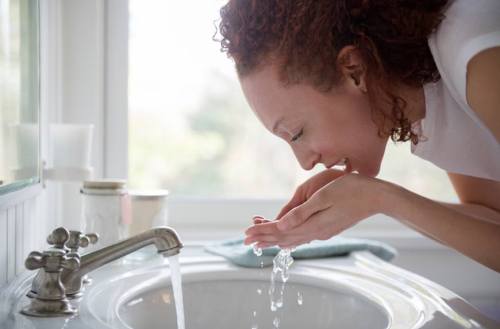Whether or not you have sensitive skin, during the summer months, certain ingredients can react negatively with your complexion. Known as phototoxicity (or photoirritation) certain chemicals react differently in the light as opposed to the dark. Simply stated, the presence of light causes ingredients to become activated, for better or for worse.
“Sensitivity to the sun, also called photosensitivity, happens when there’s a reaction caused by the sun’s ultraviolet rays,” explains Debra Jaliman, MD, a board-certified New York City dermatologist and assistant clinical professor of dermatology at Icahn School of medicine at Mount Sinai. “UV radiation reacts with certain ingredients to form compounds that make someone more sun sensitive.”
Popular anti-aging ingredients like retinoids, including tretinoin and potent retinol, can increase the skin’s sensitivity to UV rays—especially within the first six to eight weeks of use. “Retinoids are photo-inactive, which means they are broken down and less effective when exposed to sunlight,” explains dermatologist, Gary Goldfaden, MD. “Retinoids also aid in replacing old dead cells with fresh new skin cells. Therefore the skin will be new and more susceptible to sunburn, especially when you first introduce this ingredient into a regimen.”
According to Miami-based dermatologist and co-founder of the Dr. Loretta skin-care line, Loretta Ciraldo, beyond ingredients even certain weekly treatments like peels and scrubs can also be a bit too harsh during the warmer months. “One of our skin’s best defenses to UV is the dead cell layer, composed of 15 to 20 sheets of dead cells, which acts like a shield from sun,” she explains. “When we exfoliate, we significantly reduce this protective layer and sun rays penetrate into living skin where they cause the redness, swelling, discomfort, peeling and pigmentation.”
Confused on what’s safe to use? Us too. So, we caught up with a group of premier dermatologists to break down the do’s and don’ts when it comes to summer skincare ingredients.
Keep scrolling for their tips on how to spot photoactive ingredients.

Proceed with caution
Ingredients designed to assist in skin cell turnover—think alpha hydroxy acids (glycolic and lactic acids) and beta-hydroxy acid (salicylic acid) can initially make the skin more sensitive before their benefits start to kick in.
The biggest culprit? Chemical exfoliators. “[Ingredients like] retin A, AHAs and BHAs exfoliate the skin leaving it susceptible to sunburn, they remove a protective layer of skin,” explains celebrity dermatologist, Dr. Paul Jarrod Frank who partnered with Madonna on her MDNA SKIN line. “The skin needs more of a protective barrier to shield from UVA and UVB rays which can damage the skin.”
Dr. Ciraldo also warns patients to steer clear of both hydroquinone and kojic acid, two controversial lightening ingredients commonly found in fade creams (that are used to help eliminate scarring, uneven skin tone, and discoloration) in the United States despite being banned by the EU and other countries. “Hydroquinone has some similar effects to melanin, the natural skin pigment, and we believe it absorbs more UV than other ingredients and this can lead to swelling, redness and when used long term you can even get darker skin from this ingredient…kojic acid is proving to cause similar side effects [as well].”
This Parisian Skincare Brand Is Launching in the United States for the First Time—Here’s What a Derm Wants You to Know

We’re Calling It: Cleansing Balms Are the Face Wash of the Future—Here Are 3 to Add to Your Cart

This Is the One Product That Scarlett Johansson Always Keeps in Her Purse and on Her Bedside Table


Lean Into Sunscreen
Beverly Hills dermatologist and founder of Lancer Skincare, Dr. Harold Lancer—who sees clients like Kim Kardashian, Beyoncé, Jennifer Lawrence, and Victoria Beckham—is a big proponent of avoiding the sun all together.
“All products can be sun sensitive; however, if you’re using a proper sunscreen and regular application of sunscreen there shouldn’t be a problem with using those products and ingredients in the summer,” he explains.” If there is still a concern for using the products in the summer people can consider only using those products or ingredients at night, so there is no sunlight exposure.”
According to Dr. Ciraldo, a recent study measured SPF after consumers applied sunscreen to be testing (instead of having the lab assistant applying it). “On average, SPF 50 products gave an SPF protection of 13. If you’re in a swimsuit, you need to apply about two ounces of product to your face and body to get the results listed on the label.” In other words: Make sure you’re applying enough SPF to areas that will be seeing the sun.
Beyond daily sunscreen use, consider your wardrobe choices as well. “[Try to wear] sun protective clothing—think clothes with UPF, a broad-brimmed hat, and sunglasses—if you’re at the pool or beach,” adds Dr. Gary Goldenberg at Goldenberg Dermatology in NYC. “Being in the shade is also important, especially during the hours between 10 and 3. Doing all these offers the best sun protection.”

Find safer alternatives
As a general rule, Dr. Goldfaden suggests that clients switch their focus to products that protect (and repair) the skin from the sun’s harsh rays. “[I advise] selecting products that are rich in antioxidants—red tea, ferulic acid, Vitamin E, retinol, and resveratrol—protective nutrients, and vitamins, plus sun-blocking agents. When the cooler months roll in, a heavier treatment-oriented regimen can be put into place including peels and retinol, which focus on revising skin damage caused by the sun.”
Instead of worrying about if you’ll have a reaction in the sun, you can also consider a few natural alternatives. For example, consider swapping up your retinol product for a rosehip seed oil. “[It’s] high in beta carotene, vitamin C and vitamin E. However, it will not give you the results of an actual retinol. Products with actual retinol will always be more effective than a ‘natural’ [derivatives],” cautions Dr. Jaliman.
Rose oil can also be used as a replacement for hyaluronic acid. “It has a plumping and moisturizing effect similar to hyaluronic acid,” she explains. “[Again], it won’t have the same results of hyaluronic acid, but if you are looking for a natural alternative that won’t make you sun sensitive then it’s a great choice.”
Dr. Frank is also a fan of arbutin—a natural botanical extract ingredient to help reduce pigmentation caused by sun damage and is a safer option for the warmer months. “Pigmentation is the most common adverse effect of the sun,” he adds. Looking for a substitute for AHAs? Try vitamin C. “Vitamin C is called photo-protective, meaning that although it isn’t a sunscreen ingredient per se, it does limit the skin sun damage,” explains Dr. Ciraldo. And now you can stay safe and protected all summer long.
If you’re looking for a great sunscreen, these are the ones that are reef safe, and here’s a 101 on how much to actually apply.
Sign Up for Our Daily Newsletter
Get all the latest in wellness, trends, food, fitness, beauty, and more delivered right to your inbox.
Got it, you've been added to our email list.








